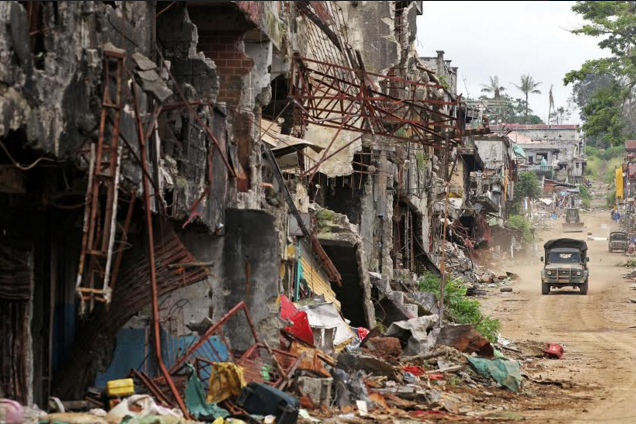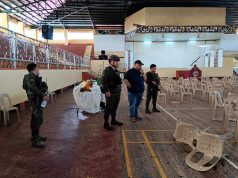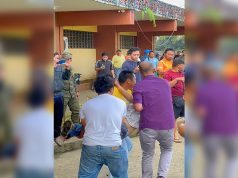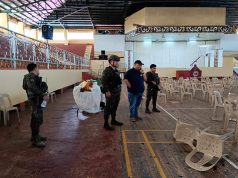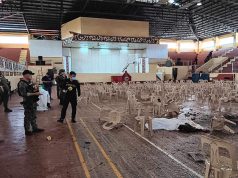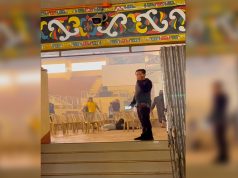MANILA, Philippines — Peace-building organization International Alert Philippines has warned of two possible sources of violence that may erupt in Marawi City shortly after the war between terrorist groups and government forces in the Lanao del Sur capital: first are people who are seeking revenge for the loss of their families and/or property, and second are issues that have to do with overlapping land claims in the South.
At the same time, International Alert Philippines stresses that the passage of the Bangsamoro Basic Law (BBL) needs to happen soon, to prevent more violence.
“It’s classic rido, clan-feuding that may happen,” said International Alert Philippines country manager Francisco Lara, Jr. on Wednesday in Taguig City, during the lauch of Conflict Alert’s 2017 report titled Guns, Drugs, and Extremism: Bangsamoro’s New Wars. Conflict Alert is International Alert Philippines’ conflict monitoring system for Mindanao.
For example, Lara learned that the arrest of the widow of Omarkhayam Maute, Indonesian Minhati Madrais, was possibly due to some affected families ratting her out.
Land issues, meanwhile, are due to the “very unstable nature of property rights in the area,” according to Lara.
Meanwhile, International Alert Philippines deputy country manager Nikki de la Rosa explained that there were overlapping claims on landholdings with “no secure property rights”.
Dela Rosa said that the organization’s data on the Autonomous Region in Muslim Mindanao from 2011 to 2016 showed that identity-based conflicts, political issues, and land-based conflicts had the highest propensity to produce more episodes of violence.
“The manner by which the reconstruction process and the rebuilding process will be undertaken should also consider identity-based conflicts and the looming land issues. Otherwise, that will unleash other sources and episodes of violence,” she said.
Lara noted that despite the defeat of the Maute Group, their ideology remains.
“There are a lot of people… young people who actually were inspired by what happened in Marawi,” he said.
De la Rosa added, “There are youth that are still influenced or find the ideology of the Maute to be legitimate, in terms of the everyday issues that they face: discrimination; some of them are graduates of universities, but up to now they cannot find a job; feelings of unfairness…”
“The entire rehabilitation, rebuilding of Marawi will certainly shape the process or the growth of extremism. If it is handled well, of course, then it will serve as a counterpoint to further radicalization among young people,” Lara said.
“But there are other issues related to that; it’s not only the rebuilding,” Lara said, adding that among these “vital issues is the passage of the BBL.”
“We’ve seen in our own work how that (non-passage of the BBL) has become a vector for the rise in violent extremism,” Lara said.
MILF’s role
Asked about the part the Moro Islamic Liberation Front would play in the coming months, Lara said the MILF would have a more “strategic role” now than they ever did before.
During the Marawi crisis, there was “clear evidence” that they stood their ground against the Maute Group and fully supported the position of the government, according to Lara.
But they are not doing so without something in exchange, Lara said. “They’re waiting for the BBL. The big question is, the more you dribble the BBL, how long will that patience last? That’s what worries us.”
Nevertheless, he added, “They’ve demonstrated their commitment to the peace process consistently.”
International Alert Philippines also tackled the rise of shadow or underground economies, which financed and enabled the Maute Group.
Conflict Alert team leader Judy Gulane noted that the members of the Maute Group were also involved in cases of kidnapping, carnapping, and extortion of businesses.
“Very clearly there was a very strong connection between the illicit drug industry and violent extremism in the case of Marawi,” Lara said. The scale of the Maute Group’s operation would not have been possible without the resources from the trade.
He cited a Mindanao State University professor as writing in International Alert Philippines’ 2013 book “Out of the Shadows: Violent conflict and the real economy of Mindanao” about the link between local government officials in Lanao del Sur and the drug trade.
It is likely that the presence of shadow economies in a particular area indicates a rise in extremism.
Cotabato to be attacked next?
Asked about the military and President Rodrigo Duterte’s concerns about Cotabato City being the next Marawi, Lara acknowledged that there were sightings of “the black flag” in some barangays there.
But he did not believe that the terrorists would be able to mobilize quickly after the “setback” in Marawi as it would take some time for them to build their resources, as well as to broker new alliances with other groups.
“That is what is disconcerting. Because there are other groups that are disappointed also with the lack of a BBL,” Lara said.
“What will most likely happen is what they’ve done in the early stages up to 2016… there will be some IED (improvised explosive device) explosions. There will probably be some KFR (kidnapping for ransom) operations… There might be some skirmishes, but they will not approach, we think, the level that was approached in Marawi,” he said.
He noted that the military was more alarmed over “the nature of a marauding, moving group rather than a Marawi-type of operation.”
“So what we should be looking at is the type of operation that they mounted for example in Mumbai,” Lara said. “Attacking hotels, small units, two squads at the most, heavily armed, and creating havoc over a period of time. That will most likely be, rather than another Marawi-type.”
Lara was referring to the terror attacks that occurred from November 26 to 29, 2008 in Mumbai, India wherein ten Pakistani men associated with the Lashkar-e-Tayyiba group targeted a number of hotels, a cinema, a café, a hospital, a train station, and a Jewish establishment. They stormed these buildings and killed 164 people.
“But given some time in the future, given that they are able to broker a broader alliance to support them, then they may attempt another Marawi-type operation,” Lara said.
Include other voices
Lara and de la Rosa emphasized the need to include the voices of the youth, the women, and local and clan leaders in the rehabilitation of Marawi.
At the moment, the government has “taken on a rehabilitation, rebuilding, physical type of response,” Lara observed.
“What does it say when the head of the committee is HUDCC (Housing and Urban Development Coordinating Council)?” he asked.
He lamented that anti-poverty and social welfare agencies “do not figure prominently into the plan.”
“It’s almost a remake of Yolanda… Is the government treating this as a natural calamity? I hope not. Are they treating this simply as a matter of building, constructing infrastructure? I hope not,” Lara said.
“Communities must be built to become resilient to the threat of extremism. To do this, people must not only look at the areas affected by it, but also places that the Maute Group tried to penetrate, but were not able to do so,” he added.

